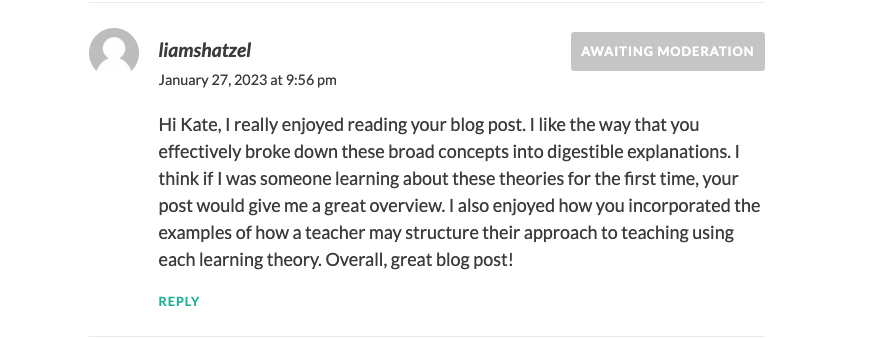Comment #1:

Comment #2:

Comment #1:

Comment #2:

In this first blog post, I’d like to share my best learning experience, which also happened to have behaviorism, cognitivism and constructivism incorporated into it.
I vividly remember the excitement I had when I boarded the plane to start my exchange semester in Germany. I had been practicing my German for months to bring it up to speed in preparation for this trip. Upon arriving in Germany, it didn’t take me long to realize that my learning had just begun.

Thinking back on this experience I found that I had been through what Ertmer and Newby (2013) describe as the “behaviorist-cognitivist-constructivist continuum.” I had been learning German casually for a couple of years before my trip, in more of a behaviorist manner. I used flashcards and Duolingo to learn lots of vocabulary. I really enjoyed Duolingo because I felt that it had enough stimulus to keep me engaged thus creating the association between getting the correct answers and levelling up in the app. At some point though, I felt like I had hit a plateau especially because I had beaten all of the levels on Duolingo. This experience was well stated by Ertmer and Newby (2013) who wrote “behavioral principles cannot adequately explain the acquisition of higher level skills or those that require a greater depth of processing” in other words, I needed to find another way to improve my German further.
This was especially true as the opportunity to go on an exchange to Germany presented itself. I jumped at the offer but knew it was time to get serious about my language learning. This was when I stepped into the cognitivism phase. I found a german tutor who was able to help me realize where I had gaps in my knowledge. As a native german speaker, my tutor was able to provide me with analogies and explanations for certain idioms and phrases that flashcards or Google translate could not explain. She also helped me by guiding me through assessments in order to see where my learning gaps were. This was when I realized I really needed to practice my verb conjugations and she helped me set goals and create a plan in order to improve in this area. I definitely felt the ability of cognitivism to “…allow[] for unfamiliar information to be put within a familiar context” (Ertmer & Newby 2013) the contextualization of words and phrases, especially being mapped to my native language, greatly helped my understanding.

The final leg of my learning journey started when I first landed at the airport in Germany. I was greeted by the unfamiliar sounds of chatter, in a language, I didn’t fully understand. Being fully immersed in a new culture while everyone around me was speaking german, brought my overall literacy to the next level. This is where I really found myself “situating in real-world contexts” (Ertmer & Newby 2013) and where most of my fluency in German came from. Thinking back, I now realize that the constructivism approach was at play here; although my trip wasn’t formally structured around a german learning curriculum, I learnt more than I ever had just by playing an active role as the learner.
Although it was a long process, this was definitely my best learning experience, lasting over months of practice and culminating in a full immersion approach. After doing the readings for this week and reflecting on my own experiences, I realized the power that the constructivist approach has.
Citations:
Ertmer, P. A., & Newby, T. J. (2013). Behaviorism, cognitivism, constructivism: Comparing critical features from an instructional design perspective. Performance improvement quarterly, 26(2), 43-71

Hi Everyone!
My name is Liam Shatzel, and I am a 3rd-year Computer Science student here at UVic.
I decided to take this class because the intersection of technology and education has been intriguing to me, especially with the recent advances in AI. The impact of tools such as ChatGPT and DALL E 2 has already started to manifest itself, and I think exploring how to incorporate these tools into curriculums would be a beneficial skill for the future.
So, hopefully, I’ll be able to incorporate some form of AI into my interactive learning resource. Overall I hope to gain the knowledge to build effective curriculums, which I also think is a very important skill.
Thanks for reading, and I look forward to reading everyone else’s blogs!
© 2026 EDCI 335 Blog
Theme by Anders Noren — Up ↑
Recent Comments